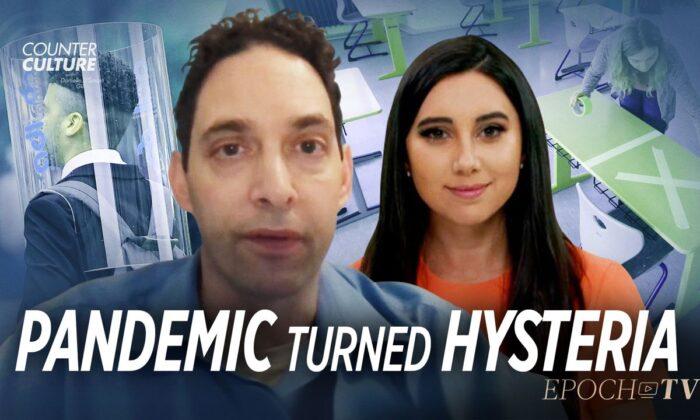Host Danielle D’Souza-Gill wastes no time in her opening monologue recapping and punching holes in the responses to the COVID-19 pandemic from both the legacy media and politicians around the globe. This may sound unnecessary since we’ve all lived through it, but her pointed delivery and firm resolve to cut through the narrative spin make this more than worth the watch. Rather than focusing on COVID itself, she talks about the totalitarianism that came with it, how quickly people were willing to give up their freedoms for just a little bit of safety, and the disastrous results beyond the COVID deaths that the mainstream media refuses to acknowledge.
She discusses this totalitarianism as if it was the virus, listing the destruction this “madness of the mind” has left in its wake, such as the economic devastation, the increase in suicidal thoughts among those aged 18–24, a spike in motor vehicle accidents, skyrocketing unemployment, and panic buying. And just how many people died of COVID who might have survived had the medical community not panicked and intubated them. She reminds the viewer that the scientific community—that bastion of knowledge that Anthony Fauci now claims as synonymous with him—quickly slid into the political mud by pushing forth the “natural origins” narrative because Trump mentioned it may have come from a lab in Wuhan. The scientific community also played politics in discounting hydroxychloroquine as a dangerous medication that would kill anyone who so much as spoke its name, simply because President Trump said it might be beneficial to COVID patients.
Hydroxychloroquine, for the record, has been a well established drug for treating malaria for over 50 years, and for many years was also used to treat patients with mild cases of rheumatoid arthritis before biologics changed the landscape of autoimmune disease in the 1990s. The suggestion that it was some unknown, untested thing in the world of medicine that had never been used off-label, had no basis in anything other than a desperate hatred of Donald Trump. Even though the single study claiming hydroxychloroquine causes heart failure has been thoroughly debunked, there are still millions of Americans who sneer at the whole thing, believing that the former President of the United States was actively trying to kill people.
These are the kinds of narratives that D’Souza-Gill attacks in her build-up to the bulk of the episode, which is an interview with Alex Berenson, a former writer for the New York Times and author of the new book, “Pandemia.” She swings around from hydroxychloroquine to a denouncement of Fauci, who dismissed hydroxychloroquine in favor of Remdesivir, which didn’t actually work for treating COVID-19 but did line the pockets of its manufacturer, Gilead Sciences. She then moves onto the practice of using ventilators on patients. Unlike the ginned-up hysteria from the legacy media about skyrocketing cases and overflowing hospitals, D’Souza-Gill brings actual statistics about the number of people killed by aggressive ventilation tactics in the early days of the pandemic. The death toll is truly shocking, and was due largely to caregivers wanting to stop their patients from coughing and spewing droplets into the air by ventilating them, which the FDA seemingly sanctioned since they were eager to get as many ventilators into hospitals as possible. The policy of ventilating set hospital staff against the people they were supposed to be caring for, and thousands died as a result.
D’Souza-Gill then pivots to the many ways citizens were abandoned by the government and how readily our inherent rights were thrown into the woodchipper for the sake of saving us from the virus. Fifteen days to slow the spread is officially upwards of day 640, with absolutely no end in sight at the federal level or in many states. Churches were shut down, businesses were shut down, schools were shut down, and there are still many people who think this is not only necessary but the right thing to do to stop the spread, while refusing to accept that COVID-19 and its variants are now endemic, like the flu or the common cold. D’Souza-Gill argues for conservatives to start speaking out and standing up in droves, to push back—the way progressives do—on policies that violate our freedoms. The government has already gone from asking for an inch to taking a mile, and it’s far beyond the time to start telling elected officials, “No.”
Having set up the episode so thoroughly, D’Souza-Gill then brings on Alex Berenson to discuss “Pandemia,” which hit shelves— both virtual and online—in November. Berenson, formerly of The New York Times, has written several thrillers since leaving the Gray Lady in 2010 to become a novelist full-time, and now is roundly dismissed as a right-wing nutjob for speaking out about COVID-19 and the mRNA vaccines. He was permanently banned from Twitter in August 2021 and The Atlantic went to the trouble of writing a hit piece on him, calling him “The Pandemic’s Wrongest Man.” Berenson has clearly struck a nerve with anyone worshiping at the altar of Anthony “the Science” Fauci, who, speaking of “wrongest” men, once suggested that AIDS could be spread through casual contact.
D’Souza-Gill begins the interview backtracking to Berenson’s days at the Times. As an investigative reporter he had an enjoyable experience, though he has definitely noticed a change in the way the Times operates since then. He notes that in the 11 years since his departure, the Times, along with other news outlets like The Washington Post and The Atlantic, have swung hard left, a swing that was accelerated by Donald Trump entering politics. He explains that the people running these organizations are personally offended by Trump and now they no longer find a story to follow and see where it leads; they decide on the narrative they want to present and discard anything that doesn’t fit. This is obvious to anyone viewing these outlets with a critical eye, but to those still under the impression that these are truly unbiased organizations it may come as something of a shock. While they’ll likely not want to believe it, coming from a former writer for the Times just might help the revelation to stick and sink in.
The two then dive into the content of Berenson’s book, from how he developed the title to the earliest content, where Berenson argues that at this point the cure is worse than the disease, and the cure isn’t curing anything anyway. Cases are on the rise because COVID-19 appears to be seasonal, and countries that have done less are faring better than countries that are doing more and have wrecked their economies and violated their citizens’ freedom. Again, this is difficult to deny with the world flying into absolute panic over the Omicron variant; countries like Australia locking everyone in their homes and removing them to quarantine camps if they’ve come in contact with someone infected, regardless of a negative test for COVID; and European countries increasingly passing nationwide vaccination mandates that will make it impossible for anyone unvaccinated to go out even for groceries.
Berenson discusses what is known about Omicron, which doesn’t appear to be deadly and seems to ignore the vaccines, making the push for vaccinations and boosters more than a little baffling. As D’Souza mentions, at this point it seems like the booster shots will be never ending with the goalposts constantly moving, like Lucy Van Pelt promising this time she really will hold the football so Charlie Brown can kick it. Berenson agrees that this is the only hope the government has for their claims that the vaccine will save us holding any weight, as the vaccines have been shown to have waning efficacy that happens pretty quickly. The government must convince people to get their first, second, third, fourth, umpteenth booster so the waning efficacy won’t undo whatever herd immunity has already been acquired, and since the government refuses to recognize natural immunity they’ve only got the vaccine basket holding all their eggs.
The problem, as Berenson highlights, is that people are sick and tired of hearing about the vaccines. We were promised that the vaccines were the way out of the pandemic. A second dose was not an unreasonable request, since there are other vaccines - particularly childhood vaccines - that require a second dose. But as D’Souza-Gill says, the talk of needing a third booster shot (and potentially a fourth to stop Omicron) is not what anyone signed up for. People got the vaccine so they could go to the grocery store again without wearing masks, and now they’re being told not only must they continue wearing masks, they have to go back for another shot. Berenson also mentions that there are many people who probably don’t know anyone who died of COVID but do know people who had a reaction to the vaccine, an inconvenient truth no one in a position of authority wants to address.
Berenson and D’Souza go on to discuss the vaccines themselves, a subject that has gotten Berenson a lot of blowback and seen him labeled an anti-vaxxer. Unfortunately for the legacy media, none of the reasons he lays out for his hesitancy surrounding the COVID-19 vaccine come across as anything other than well-thought out and logical. He doesn’t advocate explicitly for people not to get the vaccine, but for it being a choice rather than a medication prescribed and administered by the government, essentially. He doesn’t even advocate for throwing masks away if it makes someone feel better, even though he thinks masks don’t really do anything. His problem is the idea that people on the other side of the issue aren’t extending the same courtesy of allowing for personal choice to those who don’t necessarily want to put a new vaccine into their body. It’s a vaccine that doesn’t appear to work very well—although a year in use does not constitute long term data—and there has been no good explanation for why younger populations and those without pre-existing conditions should get vaccinated.
It’s because of people who glare at anyone not masking up in public that you really do need to watch and share this episode. There’s even more to the interview than what is outlined above, including the personal toll it has taken for Berenson to come out against the narrative, and every bit of it is presented calmly, rationally, and reasonably. In a world that has been infected with COVID insanity, “Pandemic Turned Hysteria” is one of the most sane discussions out there, particularly with Omicron lurking in the shadows just waiting to give someone body aches and a mild cough. There will still be many who refuse to accept that the response to the pandemic has been wildly overblown, but with any luck you’ll reach at least some in your circle who have had it with masks and boosters. Maybe even your nervous grandma will decide you don’t need to take a rapid COVID test in the garage before letting you in her house this year.




